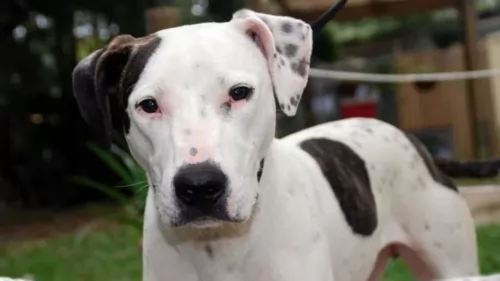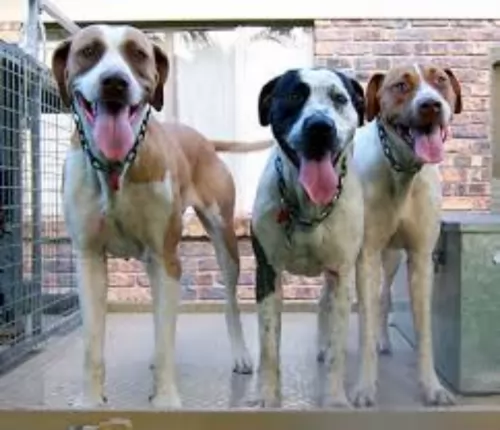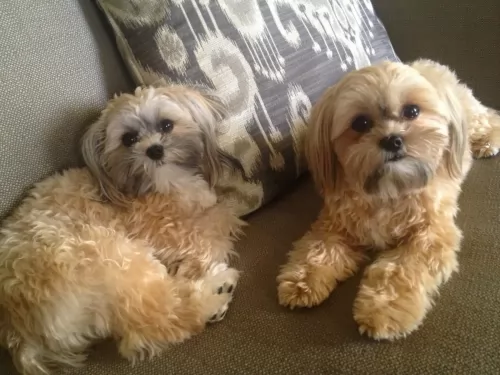 Petzlover
Petzlover Bull Arab is originated from Australia but Shorkie is originated from United States. Bull Arab may grow 45 cm / 18 inches higher than Shorkie. Bull Arab may weigh 43 kg / 95 pounds more than Shorkie. Both Bull Arab and Shorkie has same life span. Bull Arab may have more litter size than Shorkie. Bull Arab requires Low Maintenance. But Shorkie requires Moderate Maintenance
Bull Arab is originated from Australia but Shorkie is originated from United States. Bull Arab may grow 45 cm / 18 inches higher than Shorkie. Bull Arab may weigh 43 kg / 95 pounds more than Shorkie. Both Bull Arab and Shorkie has same life span. Bull Arab may have more litter size than Shorkie. Bull Arab requires Low Maintenance. But Shorkie requires Moderate Maintenance
 In the 1970’s feral pig hunters wanted a dog that could be aggressive in finding and capturing the pigs. The hunters crossed the German Shorthaired Pointer, the Bull Terrier and the Greyhound to develop the Bull Arab. It is believed that the hybrid is at least 50% Bull Terrier. It is also possible that there is some Doberman, Mastiff, Great Dane and/or Pointer in the hybrid as well.
In the 1970’s feral pig hunters wanted a dog that could be aggressive in finding and capturing the pigs. The hunters crossed the German Shorthaired Pointer, the Bull Terrier and the Greyhound to develop the Bull Arab. It is believed that the hybrid is at least 50% Bull Terrier. It is also possible that there is some Doberman, Mastiff, Great Dane and/or Pointer in the hybrid as well.
The job of the Bull Arab is to hunt out the feral pigs, grab one by the ear and hold it until the hunter arrives. They have a strong sense of smell and that is how they find the pigs.
Mike Hodgens, an Australian, developed the hybrid and added some Bloodhound as well to get that ability to smell out the pigs at great distances. They are also capable of catching buffalo and cattle. Some Australians use the breed in cattle or buffalo ranching. They are registered with the DRA or Dog Registry of America, Inc.
 The Shorkie is a mix between a Yorkshire Terrier and a Shih Tzu. This little dog actually thinks he’s quite big. He is a great watchdog and a barker, and he is a loyal and loving member of his family. He will let you know if he thinks something is going on that shouldn’t be.
The Shorkie is a mix between a Yorkshire Terrier and a Shih Tzu. This little dog actually thinks he’s quite big. He is a great watchdog and a barker, and he is a loyal and loving member of his family. He will let you know if he thinks something is going on that shouldn’t be.
This hybrid combines two breeds known for their good looks, cuteness and personalities. Shorkies get their watchdog instincts and their loyalty to their people from the Shih Tzu and their personalities and good looks from the Yorkie. This designer breed has no known standard and every puppy is different, but traits from its founding breeds will remain. Both breeds have great personalities.
Regardless of the differences within the litter, because the personalities and adorableness of the two founding breeds are equal, all of the puppies will have those characteristics. They will all be energetic, playful and think they are big dogs. They will all love people and especially kids – playing and watching over them.
The Shorkie is intelligent, trainable, and snuggly. They will also have the stubborn trait that the two founding breeds can show at times. Developed in the United States, this crossbreed is extremely popular even though they have been in existence for only ten years or so. Breeders in the U.S. began to mix these two breeds in order to develop a cute, friendly and intelligent little dog that will cuddle on your lap – perfect lap dog.
Even if we already have breeds similar to the Shorkie, its development allows breeders to diversify and improve the genetics of the dogs. It is important that these be responsible breeders whose intentions are not financial but to legitimately improve the positive traits of each breed while sorting out the undesirable or weak traits. This is the positive side of the new designer breeds.
Even though it is still being developed, at least the Shorkie seems to be a success story for designer breeds as a loving, popular little dog. It will take a lot more time and a lot more development before the Shorkie becomes an actual recognized breed. At the moment it remains a hybrid, a crossbreed, a so called designer dog.
It will be at least 7-10 generations of careful and quality breeding before the Shorkies are potentially recognized as its own pedigree breed. It is important to breed Shorkies to Shorkies in order to develop a standard that could be accepted for a new breed by the AKC and UKC. Over time the puppies must become more and more standardized in their conformity to that new breed standard. Their physical appearance and their temperament will be standardized. At this stage the second generation of Shorkies is rare. Their popularity is rising in the United Kingdom. Both Britain and Ireland have a growing interest in this hybrid.
 Mike Hodgens succeeded in developing a powerful, well built dog. The Bull Arab has a powerful head and muzzle. He has moderate length drop ears and bright eyes that match the color of his coat. His chest is neither shallow nor deep and his back is straight and strong. Their tails are tapered and pointed yet the base is thick. They are a double-coated dog. They can be white with black, tan or liver, flecked or bicolor.
Mike Hodgens succeeded in developing a powerful, well built dog. The Bull Arab has a powerful head and muzzle. He has moderate length drop ears and bright eyes that match the color of his coat. His chest is neither shallow nor deep and his back is straight and strong. Their tails are tapered and pointed yet the base is thick. They are a double-coated dog. They can be white with black, tan or liver, flecked or bicolor.
 The Shorkie, being a cross between the Yorkshire Terrier and the Shih Tzu, and as such has physical and temperament characteristics from both breeds. They could be 50-50 but most likely each puppy will be more like one of the founding parents than the other. Because there is a lot of similarity between the founding breeds there is a lot of similarity between the Shorkies.
The Shorkie, being a cross between the Yorkshire Terrier and the Shih Tzu, and as such has physical and temperament characteristics from both breeds. They could be 50-50 but most likely each puppy will be more like one of the founding parents than the other. Because there is a lot of similarity between the founding breeds there is a lot of similarity between the Shorkies.
Their hair is either wavy or straight, but it is soft. It can be a wide variety of colors and usually they have a darker mask on the face. Usually they have the eyes of the Shih Tzu – large -but not protruding. Their muzzle is short, and the skull is round with triangle ears. Their bodies are compact, small with plenty of muscle for their size. They also have fine bones and short legs, with a thin curled tail.
 The Bull Arab is intelligent, calm and loyal. Like Pit Bulls in the U.S., the Bull Arab has a reputation for aggression against both people and animals. There is no data to support these claims. They have been used as therapy dogs and companion animals very successfully. They are great with kids and very affectionate. The breed is cited as being used for companion and therapy animals
The Bull Arab is intelligent, calm and loyal. Like Pit Bulls in the U.S., the Bull Arab has a reputation for aggression against both people and animals. There is no data to support these claims. They have been used as therapy dogs and companion animals very successfully. They are great with kids and very affectionate. The breed is cited as being used for companion and therapy animals
 Many hybrids are in better health at least genetically than their parent breeds. Responsible breeders will breed any genetic issues out of their puppies. Still there are many health issues that the Shorkies are prone to. These include:
Many hybrids are in better health at least genetically than their parent breeds. Responsible breeders will breed any genetic issues out of their puppies. Still there are many health issues that the Shorkies are prone to. These include:
• Brachycephalic Airway Syndrome – “smashed face” causes problems with breathing, heat, flying and more.
• Glaucoma – Yorkshires have this, and it can be secondary to the lens Luxation.
 This is a working dog so he needs to eat the right kind of quality dog food. In order to avoid bloat do not feed large meals but rather feed one to two cups of food two to three times a day.
This is a working dog so he needs to eat the right kind of quality dog food. In order to avoid bloat do not feed large meals but rather feed one to two cups of food two to three times a day.
Hunting Accidents – this is the biggest reasons for health problems with the Bull Arab.
These are working dogs that are inactive when not working. They need a lot of exercise if they are not used for hunting. Agility, Tracking and hunting games, and field trials.
 1.Feeding the puppy - The Shorkies need a high-quality, well-balanced dry kibble. Make sure it is a formula for small, active dogs. It should have lean meat and essential minerals and vitamins. Make sure it is puppy food not adult. The puppy needs 300 -550 calories a day in 3 meals.
1.Feeding the puppy - The Shorkies need a high-quality, well-balanced dry kibble. Make sure it is a formula for small, active dogs. It should have lean meat and essential minerals and vitamins. Make sure it is puppy food not adult. The puppy needs 300 -550 calories a day in 3 meals.
2.Feeding the adult – Obesity is a problem for the Shorkie as it is for many small dogs. Don’t overfeed your adult but give her the same kind of high quality small breed dog food, only for adults. They need about 200-300 calories a day in 2 meals.
4. Games and Exercises – These are very active little dogs and need exercise every day. They needs walks, games, and time with you. They also love to cuddle with you at the end of the day. They love squeaky toys and playing fetch outside or inside.